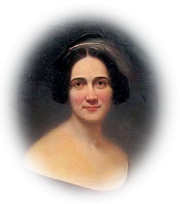July 24th.–Here Mr. Chesnut opened my door and walked in. Out of the fulness of the heart the mouth speaketh. I had to ask no questions. He gave me an account of the battle as he saw it (walking up and down my room, occasionally seating himself on a window sill, but too restless to remain still many moments); and told what regiments he was sent to bring up. He took the orders to Colonel Jackson, whose regiment stood so stock still under fire that they were called a “stone wall.” Also, they call Beauregard, Eugene, and Johnston, Marlboro. Mr. Chesnut rode with Lay’s cavalry after the retreating enemy in the pursuit, they following them until midnight. Then there came such a fall of rain–rain such as is only known in semitropical lands.
In the drawing-room, Colonel Chesnut was the “belle of the ball;” they crowded him so for news. He was the first arrival that they could get at from the field of battle. But the women had to give way to the dignitaries of the land, who were as filled with curiosity as themselves–Mr. Barnwell, Mr. Hunter, Mr. Cobb, Captain Ingraham, etc.
Wilmot de Saussure says Wilson of Massachusetts, a Senator of the United States, ¹ came to Manassas, en route to Richmond, with his dancing shoes ready for a festive scene which was to celebrate a triumph. The New York Tribune said: “In a few days we shall have Richmond, Memphis, and New Orleans. They must be taken and at once.” For “a few days” maybe now they will modestly substitute “in a few years.”
They brought me a Yankee soldier’s portfolio from the battle-field. The letters had been franked by Senator Harlan. ² One might shed tears over some of the letters. Women, wives and mothers, are the same everywhere. What a comfort the spelling was! We had been willing to admit that their universal free-school education had put them, rank and file, ahead of us literarily, but these letters do not attest that fact. The spelling is comically bad.
______
¹ Henry Wilson, son of a farm laborer and self-educated, who rose to much prominence in the Anti-Slavery contests before the war. He was elected United States Senator from Massachusetts in 1855, holding the office until 1873, when he resigned, having been elected Vice-President of the United States on the ticket with Ulysses S. Grant.
² James Harlan, United States Senator from Iowa from 1855 to 1865. In 1865 he was appointed Secretary of the Interior.
